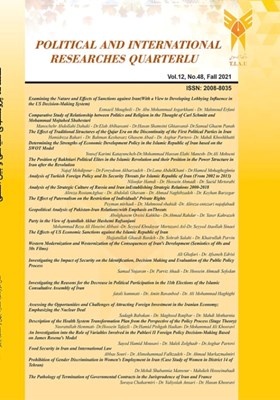Analysis of Turkish Foreign Policy and Its Security Threats for Islamic Republic of Iran (From 2002 to 2013)
Subject Areas : Political and International Researches Quarterly
niloofar Hamdi
1
,
Hossein Ahmadi
2
*
,
Saeid Mirtorabi
3
![]()
1 - PhD Student in International Relations, Shahreza Branch, Islamic Azad University, Shahreza, Iran
2 - Department of Political Science, Shahreza Branch, Islamic Azad University, Shahreza, Iran: Corresponding Author
3 - Assistant Professor of International Relations, Faculty of Law and Political Science, Kharazmi University, Tehran, Iran
Keywords: Islamic Republic of Iran, Turkish foreign policy, Copenhagen School, Security Threats,
Abstract :
An important development was made in Turkish foreign policy after Justice and Development Party got into power. The question is "What pattern did govern the security relations of Turkish foreign policy from 2002 to 2013? What security threats will follow for Iran? According to the security studies in Copenhagen School, it will be supposed that Turkish foreign policy from 2002 to 2013 had the considerable modification in the field of security and reduced the volume of security relations in terms of military individually and foreign policy of Turkish mostly relied on the multiple security subjects including the economic, social and political issues. Turkey's relationship with the USA, participation in Israel and Azerbaijan coalition, unity with Arab countries opposing Iran, posed a threat to Iran's security in the political-military, economic, and social fields. The aim of this study is to investigate the various dimensions and security effects of Turkish foreign policy.
_||_

